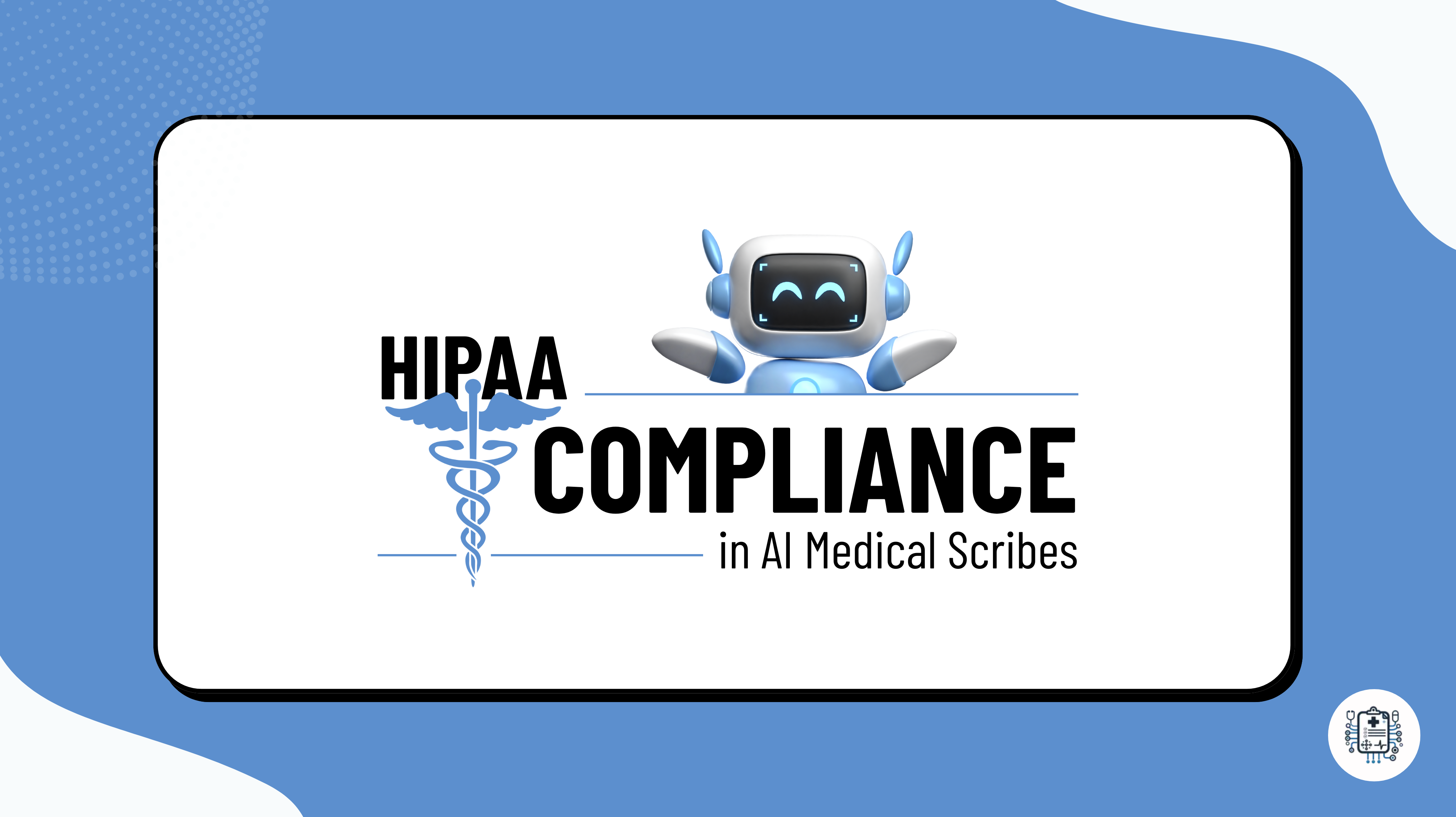
Understanding HIPAA Compliance in AI Medical Scribes
Learn how AI medical scribes maintain HIPAA compliance while revolutionizing clinical documentation, ensuring patient data security and privacy in healthcare.
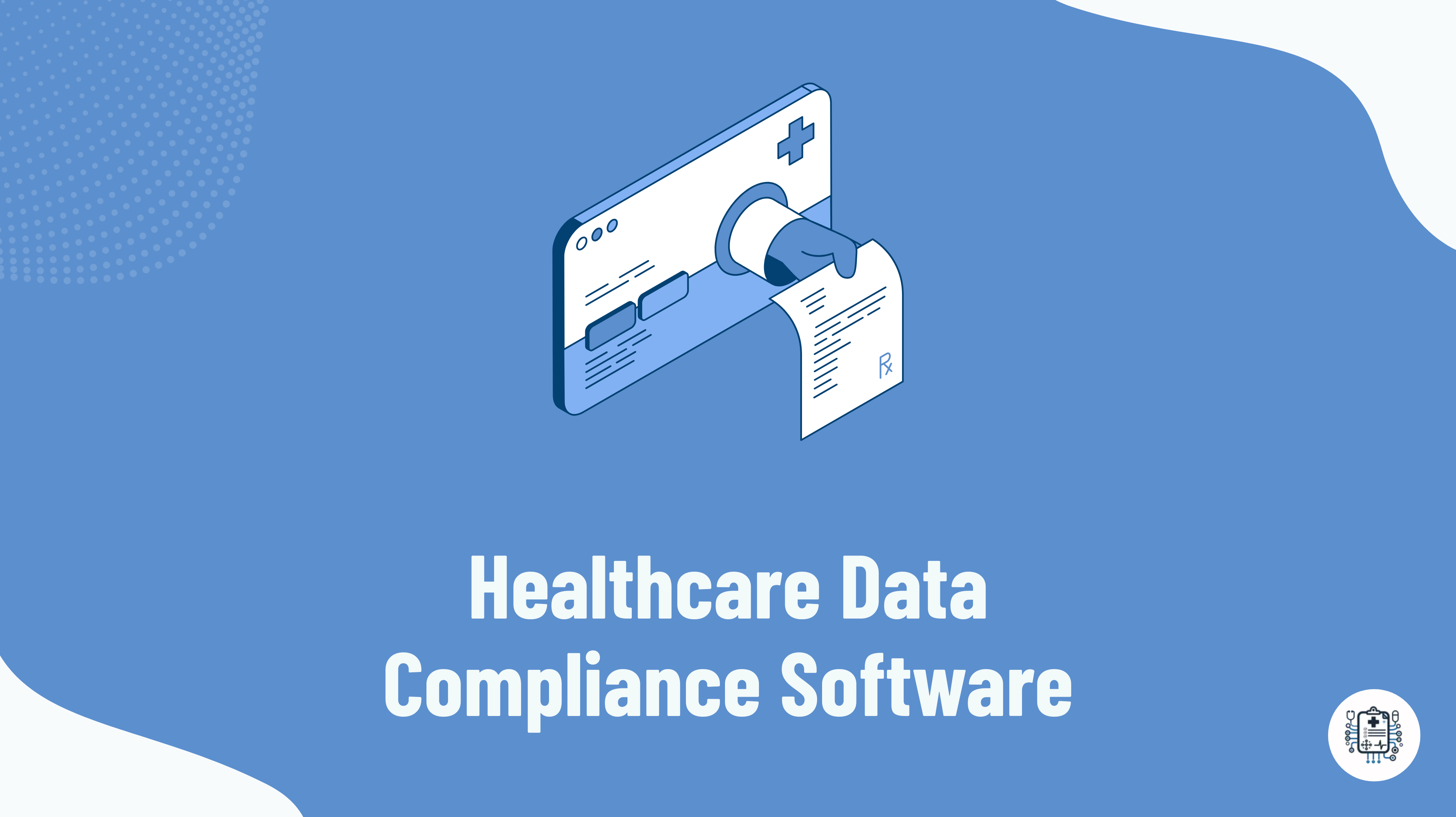
The Intersection of AI and Healthcare Privacy
The rise of artificial intelligence in healthcare has brought about transformative changes in how medical professionals handle documentation. However, with these innovations comes the critical responsibility of maintaining patient data security and privacy. HIPAA compliance in AI medical scribes is not just a legal requirement—it's a fundamental trust factor between healthcare providers and their patients.
As AI-powered documentation tools become more prevalent, understanding how they align with HIPAA standards becomes essential for any healthcare organization looking to modernize their clinical workflows.

What is HIPAA Compliance?
HIPAA (Health Insurance Portability and Accountability Act) sets the standard for protecting sensitive patient data. Two primary components define HIPAA standards:
- The Privacy Rule ensures the protection of personal health information (PHI)
- The Security Rule outlines technical safeguards like encryption, access control, and audit logging
Understanding the framework of HIPAA compliance essentials is the foundation for building trustworthy AI tools in healthcare.
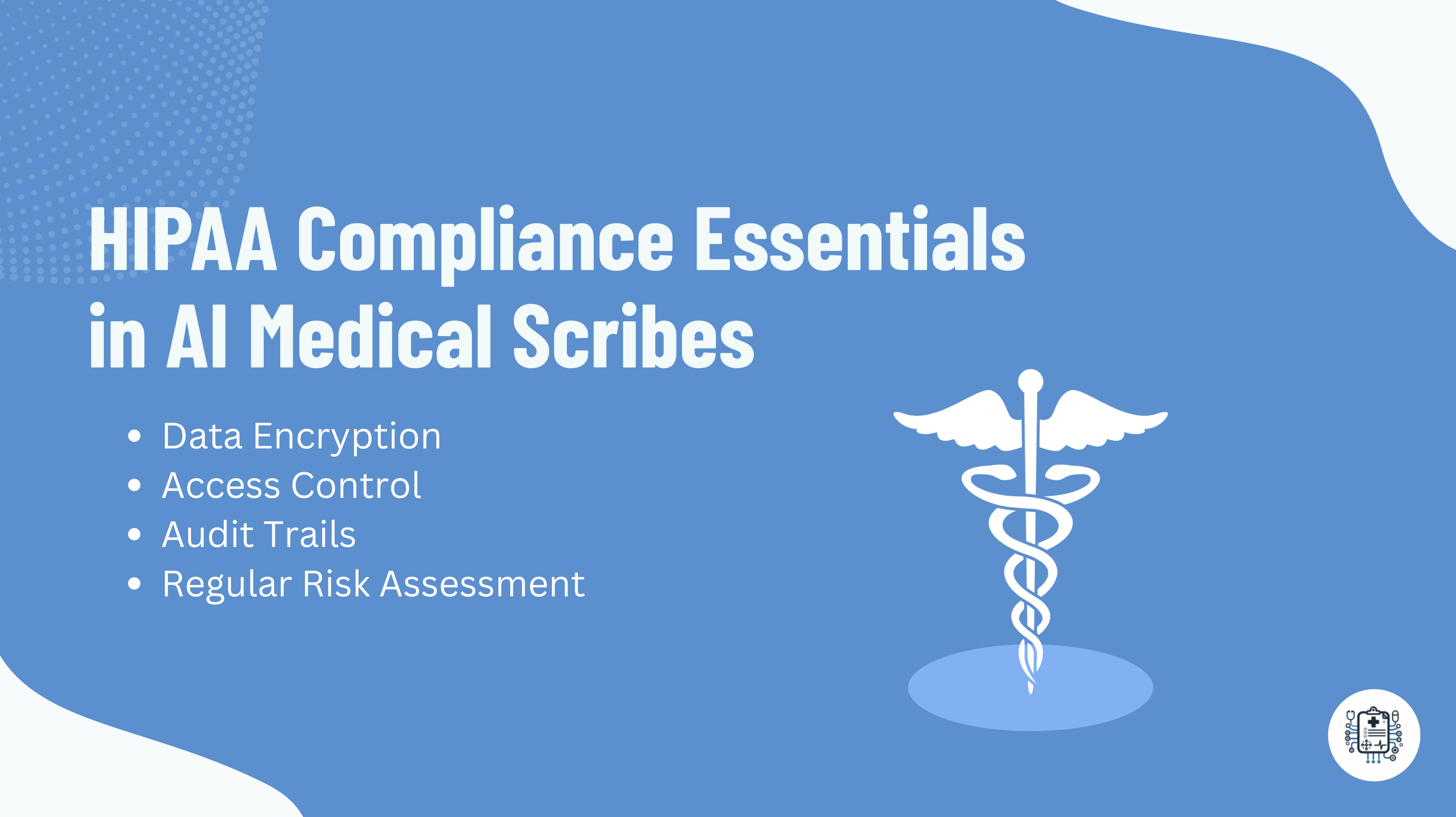
HIPAA Compliance Essentials in AI Medical Scribes
For AI-powered scribes to meet AI healthcare compliance expectations, several critical elements must be in place:
1. Data Security Measures
- Data Encryption: All patient data should be encrypted during transmission and storage
- Access Controls: Only authorized personnel should access sensitive health data
- Audit Trails: Every data access or alteration must be tracked
- Regular Risk Assessments: Consistent evaluation of vulnerabilities is key to ongoing compliance in medical documentation
2. Technical Requirements
- Secure data transmission protocols
- Encrypted storage solutions
- Access control mechanisms
- Comprehensive audit logging
- Regular security updates
These protocols help AI scribes align with healthcare data compliance software standards.
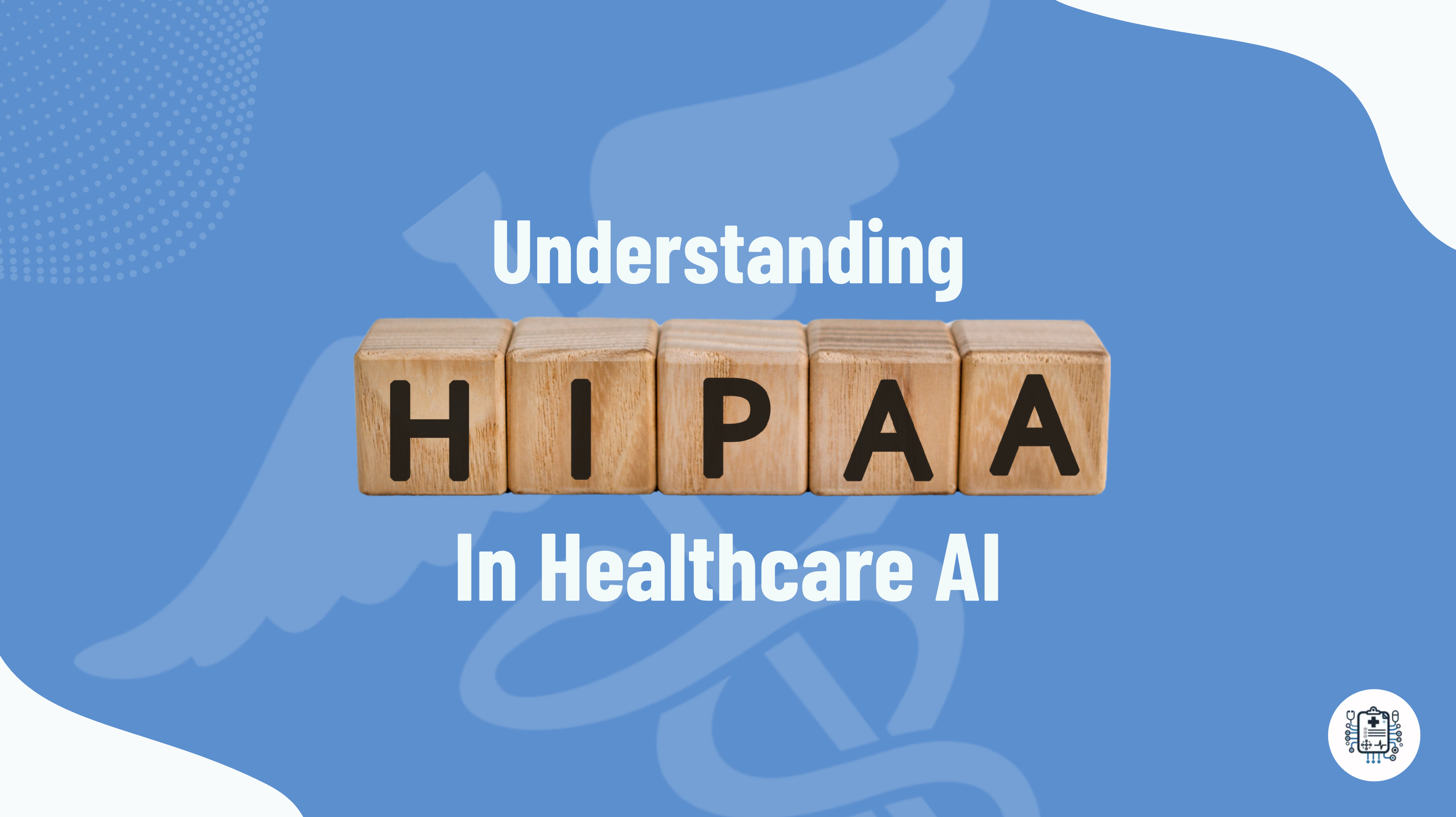
Understanding HIPAA in Healthcare AI
HIPAA compliance is a continuous commitment involving algorithm transparency, vendor accountability, and staff education. It's about recognizing the unique risks AI tools pose, especially concerning Protected Health Information (PHI) in large datasets.
AI medical scribes must be trained on de-identified data, and designs must prioritize patient data protection and integrity. Healthcare providers require assurance that AI tools are built around HIPAA compliance essentials.
Healthcare organizations should demand full documentation from AI vendors regarding how their systems manage, restrict, and secure patient information.
Key Considerations:
- Algorithm transparency
- Vendor accountability
- Staff education
- Data de-identification
- System design priorities
AI Healthcare Compliance: Best Practices
Maintaining AI healthcare compliance goes beyond checking boxes. Here are essential best practices:
1. Vendor Selection
- Choose vendors who use secure, compliant design architecture
- Ensure systems can scale without compromising patient data confidentiality
- Schedule regular HIPAA compliance audits
- Use tools that integrate healthcare data compliance software for monitoring and reporting
2. Implementation Strategy
- Conduct thorough vendor assessments
- Implement regular security audits
- Maintain comprehensive documentation
- Provide ongoing staff training
- Monitor system performance and security
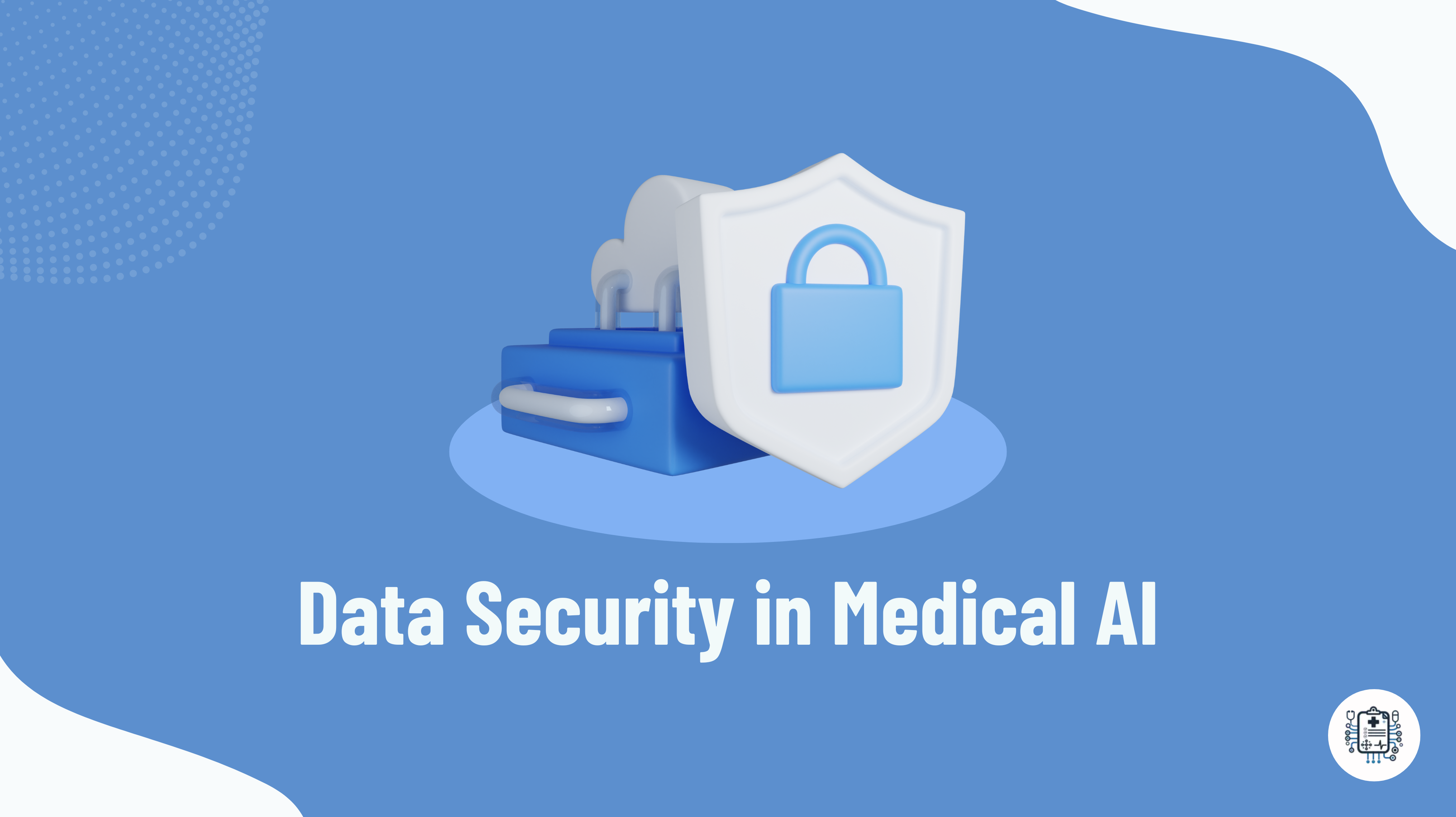
Ensuring Data Security in Medical AI
Data security in medical AI is a clinical necessity. Breaches can result in significant legal, financial, and reputational damage. Implementing robust security measures is essential for protecting patient information.
1. Technical Measures
- Implement intrusion detection systems
- Utilize tokenization for data access
- Deploy advanced encryption protocols
- Maintain comprehensive audit logs
2. Operational Practices
- Regular security assessments
- Staff training programs
- Incident response planning
- Vendor security reviews
SmartNotes AI approaches confidentiality by deleting session data and not storing audio files, ensuring that patient information is processed securely without unnecessary retention.
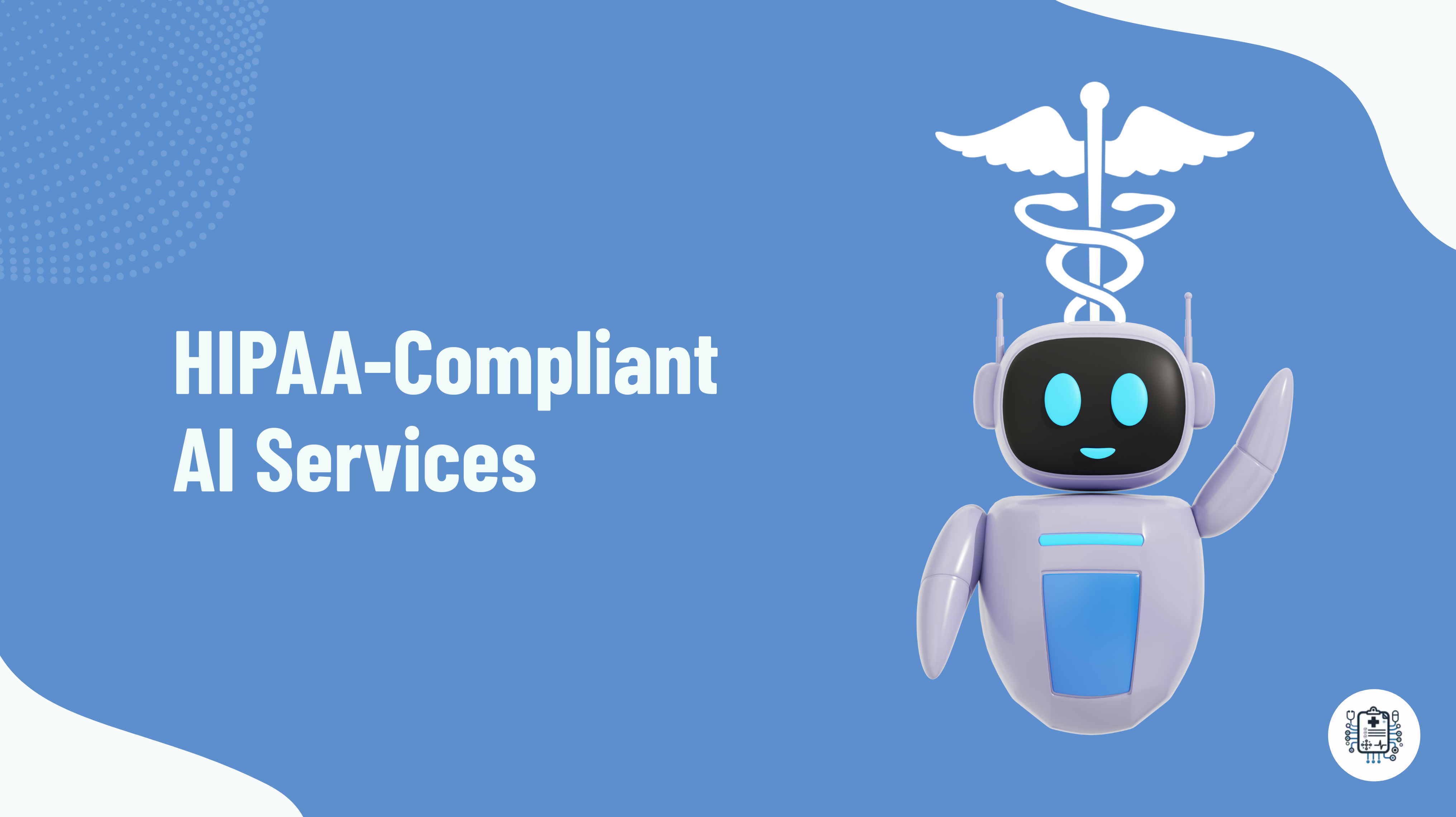
Choosing HIPAA-Compliant AI Services
Choosing HIPAA-compliant AI services responsibly means asking the right questions and understanding what makes a platform truly compliant.
1. Integration & Workflow
- Does the tool integrate with your existing compliance workflows?
- Are their security protocols transparent?
- Do they offer real-time threat monitoring?
2. Data Management
- How is data stored—temporarily or permanently?
- Where is data stored geographically?
- How is PHI handled during downtime or outages?
3. Access Control
- What role-based access controls are in place?
- How are user permissions managed?
- How often are compliance policies reviewed?
4. Security Features
- Encrypted cloud infrastructure
- Multi-factor authentication
- User activity logging
- Seamless EHR integration with privacy controls
Platforms like SmartNotes AI are designed with compliance in medical documentation as a core feature, not an afterthought.
Leveraging Healthcare Data Compliance Software
Healthcare data compliance software serves as a secondary layer of defense. It automates audits, alerts administrators of anomalies, and ensures adherence to HIPAA essentials.
Key Features
Automated Monitoring
- Real-time compliance checks
- Automated audit trails
- Anomaly detection
- Customizable alerts
Integration Benefits
- Seamless workflow integration
- Real-time compliance verification
- Automated reporting
- Enhanced security measures
Advanced compliance tools offer customizable alerts that flag any deviation from established HIPAA workflows, even during off-hours. When compliance software is paired with AI medical scribes, these platforms enhance accuracy and reduce legal exposure. It verifies that every note, update, or data pull aligns with HIPAA protocols in real time.

The Future of HIPAA-Compliant AI in Healthcare
As the healthcare industry embraces automation, understanding and implementing HIPAA compliance essentials becomes non-negotiable. From secure data handling to ethical AI practices, the stakes are too high for shortcuts.
Key Takeaways:
- HIPAA compliance is essential for AI medical documentation
- Security must be built into the system from the ground up
- Regular audits and updates are crucial
- Staff training and awareness are vital
Whether you are choosing a vendor, assessing your workflows, or just getting started with secure AI medical documentation platforms, prioritize tools that value patient data protection, align with HIPAA standards, and deliver excellence in AI healthcare compliance. SmartNotes AI is an AI-powered tool that is built on these principles, combining innovation with integrity.
